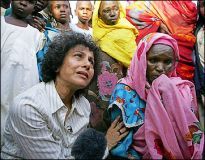Sudan “in denial” over Darfur crisis, Amnesty says
By Gideon Long
LONDON, Sept 21 (Reuters) – The Sudanese government is in denial over the extent of the crisis in Darfur, where people are still being raped, murdered and kicked out of their homes, Amnesty International said on Tuesday.
 Few atrocities are being investigated and the world is not doing enough to end a humanitarian crisis which, according to the United Nations, has claimed up to 50,000 lives and displaced 1.5 million people, it added.
Few atrocities are being investigated and the world is not doing enough to end a humanitarian crisis which, according to the United Nations, has claimed up to 50,000 lives and displaced 1.5 million people, it added.
But the London-based human rights group stopped short of backing sanctions against the Sudanese oil industry, threatened in a United Nations resolution on Darfur adopted at the weekend.
Amnesty said the only sanctions it wanted at the moment were on the sale of arms to the government in Khartoum.
“The government is in a state of denial,” Amnesty Secretary-General Irene Khan told a news conference hours after returning from a one-week mission to Darfur.
“They deny any responsibility for the failure to protect their own people. They deny that the Sudanese armed forces participate in or supported the Janjaweed militia.
“In our meetings, government ministers explained it off as a tribal conflict, propaganda by western governments and fabrication by Amnesty International.”
Darfur has for months been riven by violence involving African rebels and Arab militias known as Janjaweed.
After years of low-level fighting between Arab nomads and African farming communities, rebels took up arms last year, accusing the government of helping the Janjaweed loot and burn villages, rape women and drive farmers from their land.
The government admits arming some militias to fight the rebels but denies any links to the Janjaweed, calling them outlaws.
But Khan said the government was clearly helping the Janjaweed and was denying they were guilty of widespread rape.
“The minister of the interior told me ‘Muslim men don’t rape’,” she said.
In a separate news conference, a senior British government official warned that Darfur was “on the edge of an abyss”.
“The alternative to this not very lovable regime in Khartoum is not a more lovable regime, it is a failed state on the scale of western Europe,” the official said.
He said the crisis could get worse next April or May if displaced farmers are unable to return to their lands.
“If they are not back by then they will miss the planting season and that will be very bad,” he said.
The U.N. adopted a resolution on Saturday which threatens Sudan with oil sanctions if it does not stop atrocities in the Darfur region.
Amnesty says its own call for an embargo on sales of arms to Khartoum would be more practical and effective.
(Additional reporting by Madeline Chambers)
